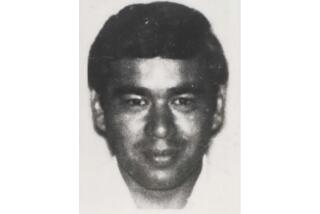Remains Identified as Saleswoman Who Disappeared in ’82 : Antelope Valley: A jury acquitted the alleged killer in 1985 because a body was never found.
- Share via
Skeletal remains found in the Antelope Valley have been identified as those of Julie Ann Church, a 23-year-old saleswoman who disappeared nearly 10 years ago and whose alleged killer was acquitted because no body had been found, authorities said Friday.
The constitutional guarantee against double jeopardy protects the man from being brought to trial again, prosecutors and the man’s defense attorney agreed.
Investigators began to suspect that the bones were Church’s shortly after they were uncovered Monday morning by a Littlerock resident digging a drainage ditch in his yard, Sheriff’s Deputy Louie Danoff said.
On Thursday night, a forensic expert at the Los Angeles County coroner’s office confirmed their hunch by comparing Church’s dental records with the exhumed teeth.
“I don’t think you ever put something like this behind you,” said Deputy Dist. Atty. Daniel L. Bershin, who unsuccessfully prosecuted Steven E. Jackson of Littlerock for the death of Church, a Lancaster auto saleswoman.
“It’s mixed emotions,” Bershin continued. “I’m very glad for the family that they found the body because it was very emotional for them and they very much wanted to put it to rest.
“And I’m very saddened because, one, I really got to know this girl and . . . I was always hopeful that if we could have found the body, we could have gotten the conviction.”
Church’s family has since moved out of California, Danoff said. They could not be reached for comment.
Bershin said Jackson, now 35, cannot be retried for Church’s death because he was acquitted of first- and second-degree murder as well as voluntary manslaughter when his lengthy trial ended in 1985.
He said it might still be possible to file federal civil rights charges against Jackson, now serving a two-year sentence in state prison for burglary.
Church’s remains were found about 150 yards from Jackson’s former home on East Avenue R-10. They were still entwined in the tattered cloth of the red dress she was wearing on the night she disappeared, said Danoff, who saved the discarded belt of that dress and tracked down every lead that came up, even after Jackson’s trial.
“Everybody has their case. This one was mine,” Danoff said.
Michael C. Eberhardt, the attorney who successfully defended Jackson, also called the case one of the most challenging of his career because of the missing body--”the Super Bowl of criminal cases,” he said.
He said he felt no regret over Jackson’s acquittal and the discovery of Church’s remains, maintaining that “even with the body, I’m not sure if he’d have been convicted of murder.”
“My initial reaction is almost feeling sorry for the jurors who are now going to have to justify their verdict, and I don’t think they had any choice given the evidence,” Eberhardt said.
The nine-month jury selection process for Jackson’s highly publicized trial, which began in 1983 and ended in 1985, was called the longest in U.S. judicial history at the time, Eberhardt and Bershin said.
Each prospective juror was interviewed individually in the judge’s chambers and questioned closely on whether he or she could convict someone of murder even if no victim’s body had been found, the attorneys recalled.
It was also difficult to seat a jury because local employers were reluctant to free their workers for the emotionally charged and lengthy case, Bershin said.
Bershin and Danoff said they grew fond of Church as they investigated her death. They read her childhood diaries and school papers, knew she had had an abortion, and came to admire her independence.
She won a monthly award for auto sales despite hostility from male co-workers, Danoff said. She also loved to dance, and to drink, Bershin said.
She had been doing both on Oct. 17, 1982, the night she disappeared, when she ran into Jackson--whose advances she had rejected in the past--at a desert disco called the Smoke Eye. Some witnesses said they saw her enjoying drinks bought by Jackson, Danoff said. Others said she looked scared, he said.
“One witness was an ex-Columbus, Ohio, police officer who happened to be at the disco at the time and at the point he saw her, she had this look on her face that almost got him to walk up to her and ask her, ‘Can I help you?’ ” Danoff recalled.
The couple left the disco and went to the Antelope Valley Inn for coffee. There, Church was overheard telling Jackson she just wanted to be friends, Bershin recalled.
Witnesses also said they overheard Jackson saying he couldn’t find his car keys, and asking Church for a ride home.
She was last seen leaving the inn’s parking lot with Jackson in her car, Bershin and Danoff said. A waitress and a busboy stopped them because they hadn’t left enough money for their tab.
Jackson went to a friend’s home the next morning in Church’s Toyota, and blurted out a confession of the slaying as they watched football on TV, Danoff and Bershin said. They said Jackson told the friend he had dumped Church’s body in a mine shaft, which led investigators on a fruitless search that ended this week.
Eberhardt said the credibility of the friend, the prosecution’s key witness, was tarnished by evidence that he was a drug dealer. But he added, “Their biggest problem was that they didn’t have a body.”
More to Read
Sign up for Essential California
The most important California stories and recommendations in your inbox every morning.
You may occasionally receive promotional content from the Los Angeles Times.













